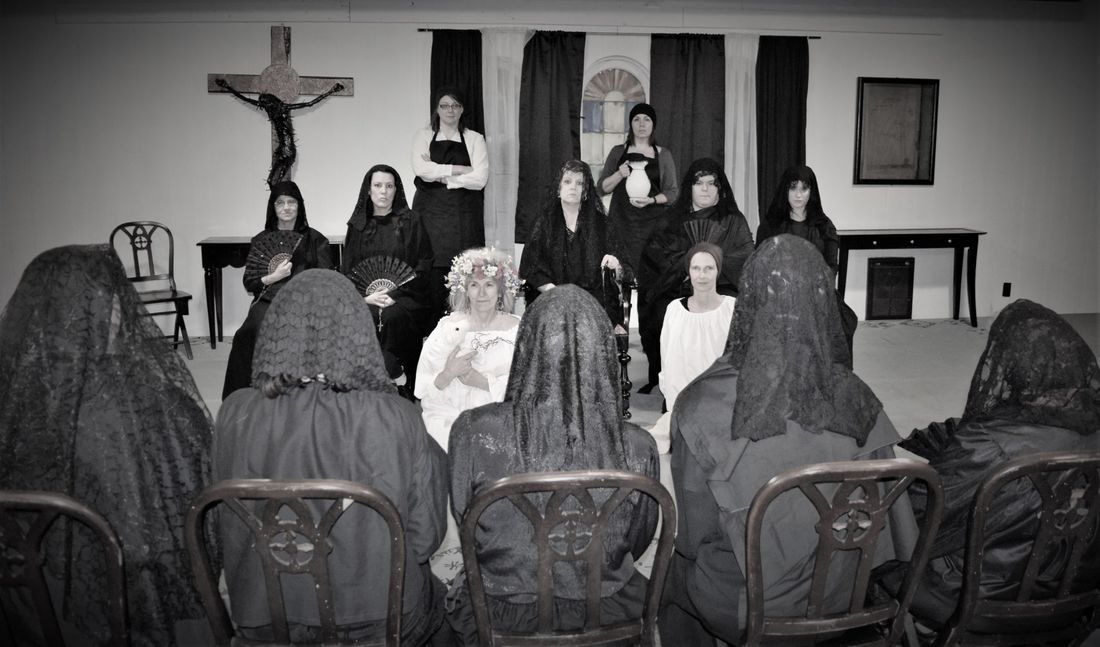|
There are places where The House of Bernarda Alba is popular enough to be produced every single year. Milwaukee is not one of those places. In over a decade of covering theatre here and over 1,000 plays, I haven’t seen Alba once. I finally had a chance to see Federico García Lorca’s classic drama last night courtesy of a production being staged this month by The Village Playhouse. Erico Ortiz directs the show. He’s personally translated the script from the original Spanish. It’s clearly been a labor of love for the director who brings together an impressively large cast for an intimate, little staging of a complex family drama set in Spain just prior to the Spanish Civil War. It’s the mid-1930s and women are given a small corner of the world to inhabit. Lorca’s classic focusses-in on those women who resided in open shadows in the margins of an era preceding the rule of the dictator Francisco Franco. Anne Gorski leads an all-woman cast as the matriarch Bernarda Alba. She is the head of a rather large and relatively wealthy household in the country. Gorski summons the gravity of a conservative authority about her. Gorski’s intensity is not quite the oppressive presence of a tyrant. Gorski is not without her power in the role, but as the drama unfolds, it becomes clear that Alba herself is losing her grip. Mary Lynn Ferwerda carries an almost whimsical sense of authority about her as Bernarda’s longtime maid La Poncia. She’s able to summon much of the familiarity between herself and LaPoncia and the ever-aloof Alba. Ferwerda has charm ans wisdom that lends considerable weight to Gorski’s performance. The drama begins with a funeral and ends with a death. In the 2.5 hours (0r s0) between these two events, we are immersed in the politics of a group of people who aren’t allowed much freedom. It’s a different prison for each and every one of the characters onstage. Servants can scarcely rest. Non-servants can scarcely do anything but rest...restlessly. The intimacy of the studio theatre stage amplifies the deliciously restless feeling of the drama. There’s a definite hierarchy rigidly defined in the confines of the household from servants to those they serve. There’s a stratification of age and stature in and within the family that can be a bit difficult to follow. There’s a rigidly-defined spectrum of ages in the cast of characters in the script that isn’t perfectly mirrored in the cast onstage. This isn’t as much of a problem as it might seem at the beginning of the first act. When the restlessness settles-in the drama between characters mix and the hierarchy ultimately falls to an engrossing interpersonal drama. They’re all prisoners here. Age and status fade into the background for a group of people who are forced to share a very small space together. Though men are completely absent from the cast, their hold on the power is ever-present. There is a handsome, young man who never appears onstage who becomes a matter of contention between some of the sisters. Everyone wants out of the house and he might be a really nice way out for one of them. Bividiana Murguia beautifully plays to the center of this conflict as the youngest daughter Adela in subtle shades that can become casually explosive. His allegiances and affections become a central struggle between nearly everyone in the cast in some way as the drama rushes from funeral to death in three solidly engrossing acts punctuated by a couple of intermissions. It would doubtlessly be difficult to get an all-latin cast for a show in Milwaukee with a cast of this size. As things settle-in over the course of the drama, the specifics of the Spanish setting fade into the background and ethnicity becomes as minor a detail as age in an interpersonal drama that works very well at its heart. That being said, it’s really, really nice to see a couple of Puerto Rican actresses in the cast. Sandra Hollander has a sparklingly earthbound charisma as a central servant for the household. Miriam Kopec is fairly haunting in and around the edges as the 27-year-old daughter Amelia. Kopec has a very magnetic presence onstage even in idle moments. It would be great to see her appear in more. The distinct Latin accents of Kopec and Hollander might not be absolutely necessary for the heart of the drama, but they’re refreshingly distinctive. Theatre audiences in Milwaukee so rarely get to hear that specific Latin voice. We need more of that voice. The Village Playhouse’s production of The House of Bernardo Alba runs through April 22nd at Inspiration Studios on 1500 S. 73rd St. in West Allis. For ticket reservations, visit Brown Paper Tickets online.
0 Comments
Leave a Reply. |
Russ BickerstaffArchives
July 2024
Categories |

 RSS Feed
RSS Feed
